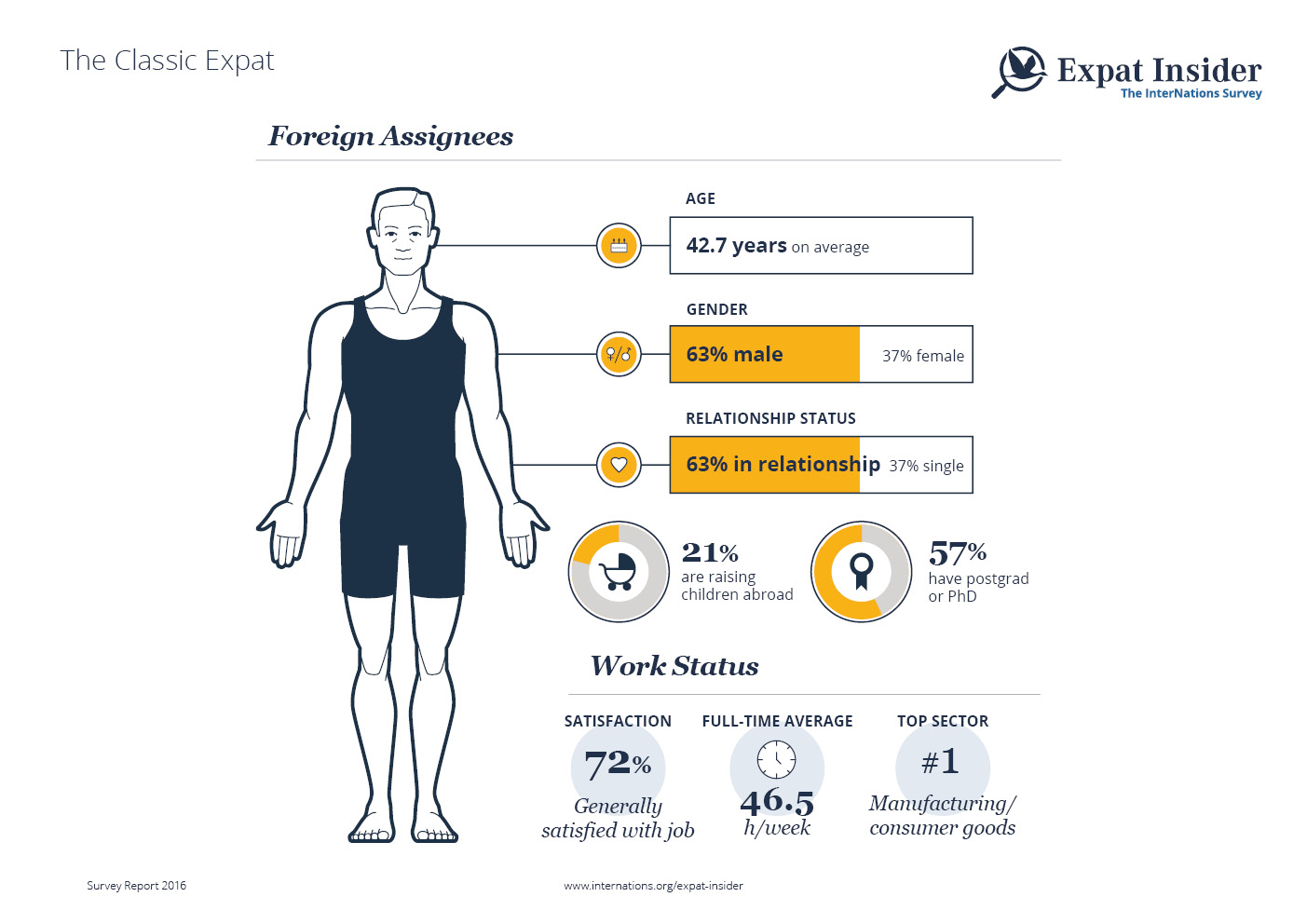The Classic Expat: Foreign Assignees
- Most work in manufacturing and consumer goods industry or public sector
- 72% are generally happy with their job
- Financially, most have benefitted from their move abroad
- 30% in long-distance relationship
Who Is the Stereotypical Expat?
The so-called classic expats, or Foreign Assignees, all state that they were sent abroad by their employer as one of their reasons for relocating. The most common sectors Foreign Assignees are found working in are the manufacturing and consumer goods industry (14%) and the public sector (10%). On average, this group is 42.7 years old and more often than not male — 63% of respondents were men.
The Foreign Assignee tends to be well educated: 52% have a postgraduate degree, compared to the worldwide average of 41%. As may be expected, considering their main reason for moving abroad, the Foreign Assignee intends, on average, to stay abroad for less time than other expat types. Indeed, most commonly, Foreign Assignees intend to live abroad for just one to three years (33%), while just 16% consider staying possibly forever compared to 31% globally.
Quite a lot of Foreign Assignees are in a relationship, which could prove challenging as 30% are not living in the same country as their partner. The most common reason for this is family (e.g. children, children’s education, etc.), as stated by 34% of those assignees in an international long-distance relationship. Meanwhile, 19% each say that it is just a short-term assignment or that their partner has different career priorities. Among Foreign Assignees, 21% have one or more dependent kids living abroad with them, while 14% have dependent children who are living in a different country.
Not Just Moving for Work
When asked to give their most important reason for relocating, 89% say that they were sent by their employer; globally the percentage was just 13%. However, when given the chance to mention multiple reasons for moving abroad, Foreign Assignees say that many other aspects played a part in their decision. About one in twenty Foreign Assignees also considered non-career-related reasons like looking for a better quality of life, an improved financial situation, the wish to live in their partner’s country or to move to a particular destination as factors that influenced their decision.
A Helping Hand
When relocating for the sake of their career, many Foreign Assignees received assistance from their employer, especially with practical issues such as visas, housing, or with financial matters such as moving costs. Indeed, 75% had help with getting a visa, work permit, or residence permit, while 65% say that their company paid for the relocation costs. However, 6% got no help at all.
About half of those who answered the question about employment support (49%) are in a relationship with a partner or spouse they met before moving. Of this sub-group, 38% received assistance with getting a visa for their partner and 17% were offered language classes or intercultural training for their spouse, but only 7% were given support regarding their partner’s career.
Meanwhile, 21% of those who responded to this question have dependent children living abroad with them. Among these parents, 27% had help from their employer with sorting out childcare or schooling for their kids. In fact, for 41% of them, the employer covered the related costs. This must have been a great help as 21% of all Foreign Assignees with dependent children send their kids to an independent daycare facility, and 48% of this expat type prefers international schools, both of which do not come cheap.
Hard Workers
The majority of Foreign Assignees (97%) work full time, working on average 46.5 hours per week compared to the worldwide average of 44.6. This is hardly surprising, considering nearly six in ten Foreign Assignees who have chosen “employee or manager” as their current employment status (58%) are in management positions — 22% are even in top management — which often require longer hours than a less senior position.
Interestingly, however, despite working longer hours, Foreign Assignees show barely any difference from the global average when it comes to their satisfaction with their working hours, with 63% saying they are overall satisfied compared to 61% globally. Indeed, the percentage of Foreign Assignees who are dissatisfied with their work-life balance is only slightly higher than for other expat types: 21% vs. 19% on average. Furthermore, 72% are generally happy with their job compared to 64% around the world.
A Successful Career Move
It would seem that most Foreign Assignees have benefitted from their move abroad. Indeed, 63% say that they earn more than they would in a similar position in their home country and 73% are positive about their financial situation — just 10% are overall negative about their personal finances. Furthermore, of the 78% who answered the question about household income, 38% state that their yearly gross household income is 100,000 USD or more, while 10% — twice the global average — have over 200,000 USD at their disposal.




